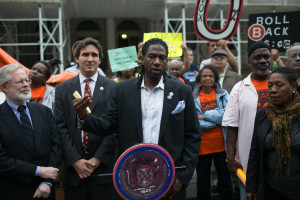
Councilmembers Jumaane Williams (center) and Ben Kallos (left) at a rally for rent reform. Image credit: William Alatriste/NYC Council
Freeze vote first of its kind in Board history, applies to one-year leases in rent-regulated units. On June 29, 2015 the Rent Guidelines Board voted 7-2 to not increase rents on one-year leases, affecting 1.2 million tenants of New York City’s rent-regulated apartments. The vote marked the first occasion where the Board decided to freeze rents. The Board’s vote also increased rents on two-year leases by 2 percent, a historically-low rate. The new rents will take effect with leases begun or renewed on October 1, 2015 or later.
At the vote, Board tenant representative Sheila Garcia proposed the freeze, arguing the financial data actually supported a rent rollback but the votes weren’t available for it. Ms. Garcia also stated tenants’ share of income consumed by rent jumped from 31.9 percent in 2011 to 33 percent in 2014. “We are creating an untenable situation for families across the city – this has to stop.” Owner representative Sara Willard criticized the vote as “myopic, biased, and selective listening”. Board chair Rachel Godsil explained her vote for the proposal by arguing Board calculations of how much rent should change to maintain constant net operating income ranged between -2 percent to .75 percent for one-year leases. A rent freeze falls within that range. Chairwoman Godsil acknowledged lobbying for a rent decrease, but argued owners of small buildings would be challenged to maintain their buildings with a decrease, and it was the Board’s role to consider them as well as tenants.
In a released statement, Mayor Bill de Blasio celebrated the rent freeze, calling it a “very tangible and fundamental impact on the lives of New Yorkers… based on months of research into the costs and pressures facing owners and tenants alike.” Councilmember and Chair of the Housing & Buildings Committee Jumaane Williams praised the vote, calling it a win for tenants and contrasted the Board’s decision with Albany’s rent-regulation deal. “[The Board’s] vote sends a clear message that the City of New York is determined to provide relief for its residents, unlike Governor Cuomo and Albany who recently enacted detrimental rent laws that could eliminate approximately 90,000 affordable housing units due to deregulation over the next four years.” Councilmember Ben Kallos said “In a time of classic Albany dysfunction, New York City stood strong for tenant rights. Now, one million New York City homes do not have to worry about rising prices this year.”
The vote was opposed by the Rent Stabilization Association, a group representing 25,000 landlords. After the vote, the RSA criticized a freeze as running counter to Mayor de Blasio’s affordable housing plan, arguing rent increase are invested into preserving buildings. RSA President Joseph Strasburg stated landlords will now have to “forgo repairing, maintaining, and preserving their apartments, which will trigger the deterioration of quality affordable housing [Mayor] de Blasio pretends to care about.”
Rent Guidelines Board: Public Meeting (Jun. 29, 2015).
By: Michael Twomey (Michael is the CityLaw Fellow and a New York Law School graduate, Class of 2014).


The issues discussed relate to most countries implementing affordable housing. They formed useful inputs for me as we are engaged in determining policies for affordable housing.